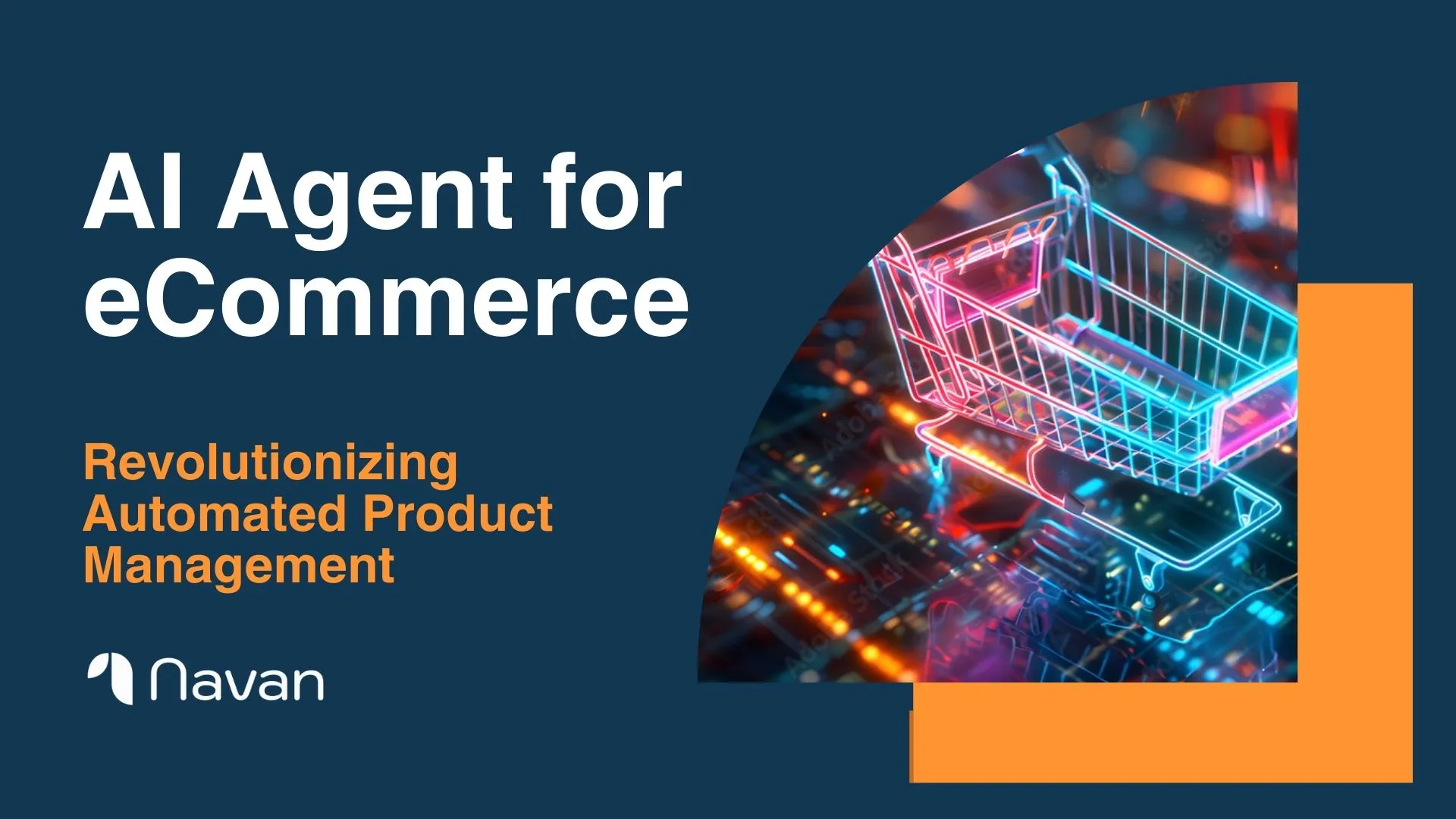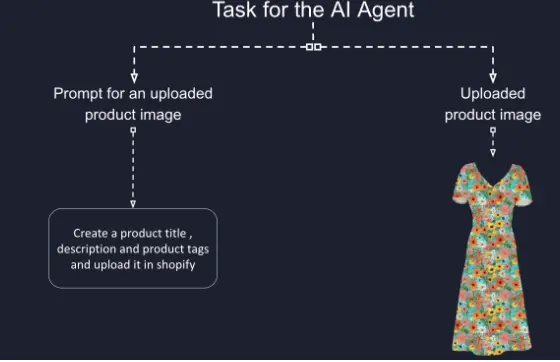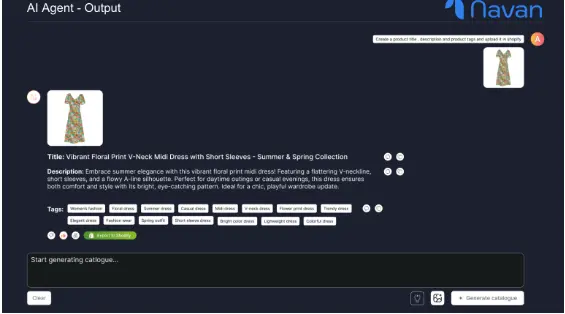Use Case - AI Agent for eCommerce - Automated Product Management

In today's fast-paced eCommerce and retail industry, efficiency is more than just a buzzword—it's a necessity. As competition intensifies, companies which are leading online clothing retailers, are turning to AI agents for automated product management. This innovation not only streamlines operations but also ensures accuracy and consistency in product listings, which is crucial for driving sales growth.
A recent study by McKinsey reveals that AI can reduce operational costs by up to 30% in retail businesses. Leading online clothing retailers are increasingly adopting AI agents for automated product management, ensuring accuracy and consistency in product listings while driving sales growth. AI technologies can change how businesses handle product listings, customer interactions, and inventory by automating routine tasks, thus saving time, reducing costs, and optimizing resources. This allows companies to focus on strategic growth and customer engagement, ultimately enhancing productivity and improving their bottom line.
Key Benefits of AI Implementation:
Time Savings: AI agents drastically reduce the time required to list products across multiple platforms. What might take a team several hours or even days can now be accomplished in minutes. This efficiency is particularly beneficial during peak seasons or when expanding product lines.
Cost Reduction: Automating tasks like product categorization, content generation, and multi-platform uploads minimizes the need for extensive manual labor. This reduction in labor costs can significantly improve a company's bottom line. According to a study by McKinsey, AI can reduce operational costs by up to 30% in retail businesses.
Resource Optimization: With AI handling repetitive tasks, employees can focus on more critical areas such as customer service, strategic planning, and market analysis. This shift not only enhances productivity but also leads to better job satisfaction and reduced turnover rates.
These advancements not only streamline operations but also contribute to better job satisfaction and lower turnover rates, positioning businesses to thrive in an ever-evolving market.
Let's go through how AI Agents for eCommerce Product Management and Inventory Management come into play with a practical industry-based use case approach:
AI Agents for eCommerce: FashionHub's AI-Driven Approach for Automated Product Management
Business Scenario
For example, let's take an imaginary clothing retailer, "FashionHub," which sells a wide range of apparel online. FashionHub's product catalog includes men's, women's, party, and casual wear. The company faces challenges in efficiently managing product listings on various eCommerce platforms such as Amazon and Shopify.
Objectives
Improve Efficiency: Automate the identification and classification of clothing items.
Enhance Accuracy: Ensure consistent and accurate product details across all eCommerce platforms.
Save Time: Reduce the manual effort involved in uploading product details and images.
Scalability: Enable the seamless handling of a growing number of products.
Solution: AI Agent for Automated Product Management
Features and Capabilities
Product Identification, Classification and Recommendations
The AI agent uses computer vision to analyze images of clothing items. It identifies the type of clothing (e.g., men's, women's, party, casual) based on visual characteristics and predefined categories. Ai agents in eCommerce largely help with smart suggestions of products to customers based on their browsing and purchase history.
Automated Content Generation
Automatically generates product descriptions, titles, and specifications based on the identified category and attributes. Includes details such as fabric type, size options, color variations, and style descriptions.
Multi-Platform Integration
Integrates with major eCommerce platforms like Amazon and Shopify through APIs. Automatically uploads product images, descriptions, prices, and other relevant details to multiple platforms simultaneously.
Dynamic Price Optimization
Allows users to set prices and other specific details for each product. Ensures consistency across all platforms by updating changes in one central location.
Bulk Processing
Supports bulk uploading of multiple products at once, significantly reducing the time required for large catalogs.
Automated Inventory Management
Focuses on real-time inventory monitoring and automated reordering of low stock items. This ensures that stock levels are always optimal, preventing both overstock and stockouts, and improving overall inventory efficiency.
Workflow

Image Upload
User uploads images of new clothing items to the AI agent.
Automated Classification and Content Generation
The AI agent analyzes images and classifies each item into categories such as men's, women's, party, or casual wear. It then generates detailed product descriptions, specifications, and titles based on the identified categories and attributes.

Multi-Platform Upload
The AI agent uploads the complete product information, including images, descriptions, prices, and other details, to all connected eCommerce platforms like Amazon and Shopify.
Verification and Confirmation
The user verifies the uploaded listings to ensure accuracy and completeness.
AI Chatbot and Data Assistant
The AI chatbot assists in real-time customer interactions, answering queries, and providing product recommendations.

Signing Off - Harness the power of AI Agents for eCommerce
The implementation of AI agents for automated product management in the eCommerce and retail industry is a game-changer for companies like FashionHub. By leveraging advanced technologies such as computer vision and automated content generation, businesses can streamline their operations, enhance accuracy, and achieve significant time and cost savings. These AI-driven solutions not only optimize resource utilization but also ensure consistency and scalability, which are critical for maintaining a competitive edge in a rapidly evolving market.
As illustrated by FashionHub's example, the benefits of adopting AI agents extend beyond operational efficiency. They enable companies to focus on strategic initiatives, improve customer service, and ultimately drive sales growth. The future of eCommerce and retail is undeniably intertwined with AI, and those who embrace these technologies will be better positioned to thrive in this dynamic landscape. By automating routine tasks, reducing errors, and ensuring consistency across platforms, AI agents represent a pivotal step towards a more efficient and profitable business model.
Navan AI is built for this exact purpose—saving cost, time, and effort. Its suite of tools is designed to tackle the complexities of product management, from inventory tracking and pricing optimization to personalized marketing and customer engagement. Navan AI enhances product catalog management accuracy by 56% better than the industry standard. By harnessing the power of AI, businesses can make data-driven decisions, anticipate market trends, and respond swiftly to changes in consumer demand. To know more about how Navan AI can help in your eCommerce strategy, check out here navan.ai.